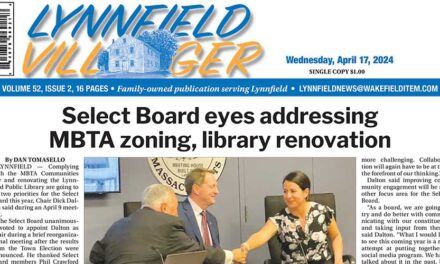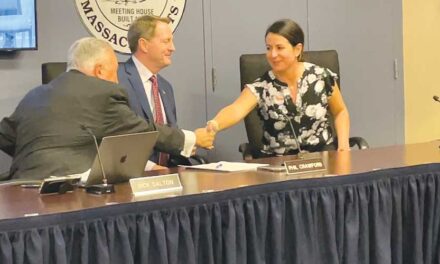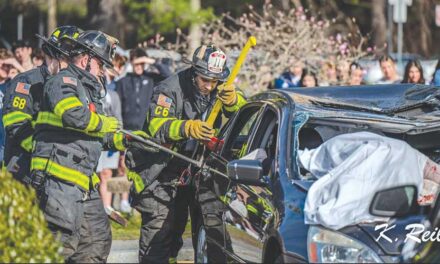Published March 27, 2019
By DAN TOMASELLO
LYNNFIELD — The fight over the controversial Wakefield-Lynnfield Rail Trail continued to escalate during the Massachusetts Department of Transportation’s March 19 public hearing in the Lynnfield Middle School auditorium.
MassDOT held the three-hour public hearing in order to gain feedback about the rail trail’s 25 percent design. MassDOT Supervising Project Manager Shahpar Negah acknowledged Lynnfield residents will be voting on a non-binding ballot question on April 9 that will ask voters whether they want to proceed with the project.
“MassDOT is aware there is some opposition to the project,” said Negha. “We expect that. We are not here to push the project. If Lynnfield decides it does not want the project, we are not going to push it.”
WorldTech Engineering Vice President Bill Mertz gave an overview of the proposed rail trail. He said the Wakefield-Lynnfield Rail Trail would begin at the Main Street and Bennett Street intersection in Wakefield near the Galvin Middle School, extend north through Lynnfield and would go to the Peabody line. A portion of the rail trail would go through Reedy Meadow via an elevated boardwalk. He said 1.8 miles of the trail would be in Wakefield and 2.5 miles would be in Lynnfield.
Mertz said the project would include paved parking areas, safety improvements at roadway crossings, new signs and markers, and landscaping.
If the $10 million project moves forward, Mertz projects the rail trail’s final design and permitting process would be completed by the fall of 2021. He anticipates construction would begin in the spring of 2022.
“There is a lot of design work remaining,” said Mertz.
Negha said 80 percent of the project would be financed by federal transportation funds. She said MassDOT would fund the remaining 20 percent.
Lengthy debate
After Mertz concluded his presentation, residents from both towns were given an opportunity to weigh in on the proposed rail trail. Local officials from both communities were given an opportunity to speak as well.
State Sen. Jason Lewis (D-Winchester), whose district includes Wakefield, said he is a strong supporter of recreational path projects including the Wakefield-Lynnfield Rail Trail. He noted there was opposition to the Tri-Community Greenway when it was first proposed, but said residents in Stoneham, Winchester and Woburn have “embraced” and “celebrated” that trail even though it hasn’t opened yet.
“These kinds of projects are incredibly difficult to design and build, and for that reason they typically take many, many years,” said Lewis. “The Tri-Community project was initiated in the 1980s and was just constructed in the last year or so. That’s because there were a number of issues that needed to be worked out along the way. Working out these details and addressing concerns to abutters and local businesses is par for the course. It’s very important for people involved with these projects to hear those concerns and work very hard to address them.”
Lynnfield Board of Selectmen Chairman Dick Dalton noted the April 2017 Town Meeting authorized the selectmen to enter into a 99-year lease with the MBTA by a 342-341 vote. He said the April 9 vote is designed to give local officials and state lawmakers a “clear indication” that the town wants to proceed with the rail trail.
Recreational Path Committee Chairman Gerard Noumi said the committee has endorsed a “yes” vote at the April 9 Town Election in order to allow the project to reach the 100 percent design phase.
Unlike Lynnfield, Wakefield Town Administrator Stephen P. Maio said the 2018 Town Meeting unanimously voted to enter into a 99-lease with the MBTA. He said the rail trail would be a “wonderful” recreational opportunity that would benefit Wakefield’s downtown business district.
“Wakefield is 100 percent behind this project,” said Maio. “As we look to bring business into our downtown, the recreational path is a big part of that. We feel this is a cornerstone for not only healthy living but economically healthy living.”
Lynnfield Police Chief David Breen noted there has been reports of rail trail signs being stolen in advance of the April 9 vote. He urged both sides to be civil.
“I want to tell everybody here today to respect each others’ opinion about what is happening in town,” said Breen. “You don’t have to agree with your neighbors, but I would urge you to respect each others’ right to have an opinion.”
Patrice Lane resident Pat Campbell said she opposes the rail trail because she fears it would cause “environmental damage” to Reedy Meadow. She also said the project is a waste of taxpayer money.
“The project is not needed and would lead to needless expenditure of local, state and federal funds, which comes from taxpayers,” said Campbell. “The people in Lynnfield do not need this project.”
Locksley Road resident Patrick Curley, who works as an attorney in Wakefield, said he and his wife want to take their children for bike rides around town. However, he said they are concerned about distracted driving.
“The number of people looking at their phones while driving is unbelievable,” said Curley. “That presents a danger to my children. Having this safe way of recreating is very appealing to me and my family.”
Rail trail opponent Gill Giugliano accused Curley of hypocrisy because he opposed the Bali Hai apartment building project that would have been near his home. The Zoning Board of Appeals rejected the proposed apartment building last November, which has since been appealed to the Land Court.
“(Curley) did not want those units built in his backyard, but he is perfectly fine with building the rail trail 25-feet behind the kitchen table of us abutters,” said Giugliano. “I want to ask all of these people in favor the trail not to do unto others as you have them do unto you.”
While Locksley Road resident Courtney Caggiano-Nunley acknowledged the rail trail is incredibly polarizing, she believes it would be a positive addition to Lynnfield.
“My family has been in this community for over 40 years,” said Caggiano-Nunley. “When I was growing up, you could bike all over this town. There were no fears of distracted driving and traffic. I want a safe place for my kids to ride a bike. I want a safe place for me to pick up rollerblading again. To the abutters, I get it. Most of you live in pristine and remote areas in beautiful landscaped homes, and seeing people on their bikes and walking by your property was not on the blueprints. But I can say, as someone who lives on Locksley Road, seeing people walk by with their dogs, talking with friends and trying to find nature has a positive impact. Let’s not be afraid of each other.”
Thomas Road resident Peter Perlmutter said he supports the rail trail because it would be a safe place for cyclists like him.
“A rail trail would separate cyclists and pedestrians from motorized vehicles,” said Perlmutter. “Now, pedestrians and cyclists are forced to share lanes. Ninety-eight percent of drivers are considerate of cyclists and are prepared to share the road, but 1 to 2 percent may not be of the same persuasion. While 98 percent is terrific on a school exam, it is deadly on the road.”
Wakefield abutter Rob Sanderson, 119 Vernon St., said he supports the rail trail.
“I think I am the only abutter who doesn’t want the fence,” said Sanderson. “Maybe some shrubberies. I am excited about the opportunity of having my daughters grow up and walk one way to the Dolbeare School and the other way to the Galvin Middle School when they get older. It would also help me in my quest to bike to work more often.”
King Rail Drive resident Chris Martone said he opposes the rail trail because he believes it would have a negative effect on wildlife. He is a member of the Brookline Bird Club’s Lynnfield Marsh Survey Team, which studies birds in Reedy Meadow.
“We are against the rail trail because it puts the protected wetland at risk of losing rare and endangered marsh birds, which require large areas of undisturbed freshwater marsh,” said Martone.
Perry Avenue resident Debbie LaConte said she opposes the rail trail project as well.
“I am so concerned that our town is so divided,” said LaConte. “Between the rail trail and the cinema, we are a town in crisis. We have enough recreation areas and we do not need this rail trail.”
A Wakefield woman who abuts the trail expressed concerns about privacy and safety, and said she wanted to learn more about the various screening options that would be included in the project. Wakefield DPW Director Rick Stinson said his engineering staff is willing to meet with her to discuss the screening options that will be available to abutters.
“We want to provide you with what makes you feel comfortable,” said Stinson.




